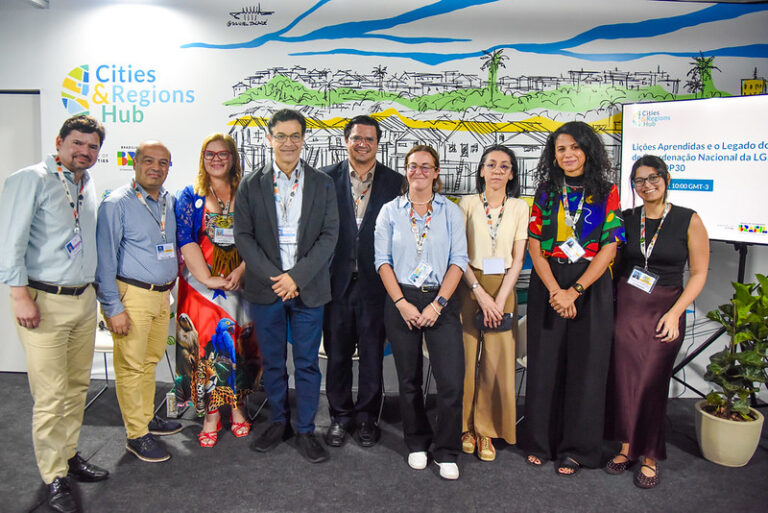An urban COP30 may be coming. Are national plans ready for it?
National governments are preparing to submit their new climate plans, also known as Nationally Determined Contributions or NDCs 3.0, ahead of the next UN Climate Change Conference (COP30) in Belém, Brazil. One of the drivers of success for COP30 could be how well these plans reflect and enable climate action in cities.
This was the driving message behind a high-level side event “Urban COP30 and beyond: Multilevel action and sustainable urbanization to deliver on the Paris Agreement” at the Bonn Climate Talks (SB62) on 17 June 2025. Organized by UN-Habitat, ICLEI – Local Governments for Sustainability, and the University of Southern Denmark, the event brought together national and local leaders to launch new guidelines and chart a shared path toward more ambitious, inclusive, and multilevel climate plans.
Why cities matter
Over 70% of global greenhouse gas emissions originate in urban areas. Cities are also where climate impacts are increasingly felt. Yet, many national climate plans still overlook this crucial reality. Only 27% of national climate plans include strong urban content. That means most NDCs fail to reflect the specific challenges cities face, propose targeted solutions, or outline how local and national governments will work together to deliver them. The moment to fix that is now.
“Cities and regions are not just impacted by climate change. They are essential actors in confronting it,” said ICLEI Deputy Secretary General Kobie Brand. “However, ambition at the local level is not enough on its own. We need a system that enables, connects, and scales local leadership.”
Antonio da Costa e Silva, Chief International Advisor at the Ministry of Cities, echoed Brand’s remarks and highlighted how his country’s “updated NDC includes not just top-down targets, but the voices of our 5,570 municipalities and 27 states.” For Brazil, this is not new territory, it’s embedded in the country’s federal structure. “Climate federalism is our response to the need for multilevel action,” he concluded.

A new guide to strengthen urban content in NDCs
At the event, UN-Habitat and SDU officially launched Seizing the Urban Opportunity: A 3-step guide for strengthening Nationally Determined Contributions (NDCs) 3.0. The guidelines present a clear three-step approach for national governments to assess, prepare, and co-design more urban-inclusive climate plans.

“This is not about a consultant improving the text of an NDC. This is about building a strong stakeholder engagement process that reflects real needs,” said Bernhard Barth, Program Coordinator for Climate Change and Urban Environment at UN-Habitat. “Even countries with high urban ratings in their current NDCs still have room for improvement. And we have only five months to make it happen.”
The three steps – Assess, Prepare, Co-Design – provide a roadmap for aligning national targets with local realities. They offer practical tools for integrating urban data, engaging stakeholders, and translating local plans into national commitments.
How these principles look like in action
Representatives from Brazil, Panama, Rwanda, and South Africa shared how they are already embedding urban ambition into their national climate processes.
In Panama, a more radical approach is underway. “We are no longer submitting fragmented frameworks,” said Juan Carlos Monterrey-Gómez, Special Representative for Climate Change. “Instead, we are launching a single, simple and holistic instrument: the Nature Pledge, which includes the commitments of every community and municipality.”
Rwanda, meanwhile, is prioritizing nationwide consultation. “We worked with all districts to make sure that the NDC 3.0 reflects urbanization, and we’re aligning climate response with development planning,” said Faustin Munyazikwiye, Deputy Director General of the Rwanda Environment Management Authority. This nationwide consultation was supported by WRI and ICLEI through GEF-7 funded UrbanShift aimed at supporting multilevel dialogues.
From Amapá, Brazil’s northernmost state, Gutemberg Silva remarked on the urgency of turning resilience into policy. “Our state has one of the world’s highest proportions of preserved forest, but we face increasing urban inequality and climate risks,” he said. “We are using data, planning, and territorial governance to build green, climate-resilient cities from the ground up.”
In South Africa, Dorah Marema of the South African Local Government Association called for deeper integration. “We must build from the bottom up, from the communities. The municipality must be in the driving seat, not as a recipient of policy, but as a creator of solutions.”
Each speaker’s intervention pointed to a shared conclusion: When local and national governments work together, the results are more ambitious, more realistic, and more likely to succeed.
Town Hall COPs: Bringing COP discussions into each community
This collaborative spirit is reflected in ICLEI’s Town Hall COPs initiative, now gaining momentum worldwide. These are community-led climate dialogues designed to bring global climate goals home. Inspired by the structure of the UN Climate Change Conferences (COPs), these local events create an inclusive space to review local climate progress, align with national climate goals, and identify actions that address real community priorities like health, justice, jobs, and nature
Town Hall COPs are already being implemented in countries like Malaysia, Türkiye, the United States and across Latin America, helping to connect local expertise with national targets. Town Hall COPs can be a tool for National Governments to facilitate their commitment to CHAMP or for communities from non-CHAMP endorsing countries to engage their national governments in the NDC 3.0 process.

As UN-Habitat’s new guidelines make clear, this multilevel process is not just about planning; it’s about unlocking finance, enabling accountability, and ensuring implementation reaches the communities most in need.
Featured photo credit: ICLEI – Local Governments for Sustainability






